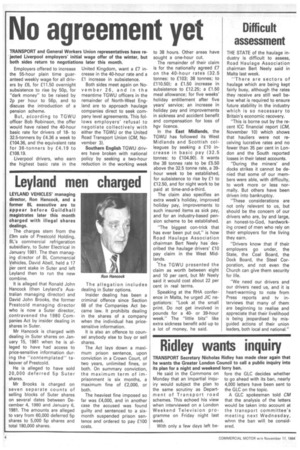Leyland men charged
Page 6

If you've noticed an error in this article please click here to report it so we can fix it.
LEYLAND VEHICLES' managing director, Ron Hancock, and a former BL executive are to appear before Guildhall magistrates later this month charged with illegal shares dealings.
The charges stem from the £9m sale of Prestcold Holding, BL's commercial refrigeration subsidiary, to Suter Electrical in January 1981. The then managing director of BL Commercial Vehicles, David Abell, held a 17 per cent stake in Suter and left Leyland then to run the new combine.
it is alleged that Ronald John Hancock (then Leyland's Australian managing director) and David John Brooks, the former Prestcold managing director who is now a Suter director, contravened the 1980 Companies Act by insider dealing in shares in Suter.
Mr Hancock is charged with dealing in Suter shares on January 15, 1981 when he is alleged to have had access to price-sensitive information during the "contemplated" takeover of Prestcold.
He is alleged to have sold 20,000 deferred 5p Suter shares.
Mr Brooks is charged on seven separate counts of selling blocks of Suter shares on several dates between December 4, 1980 and January 6, 1981. The amounts are alleged to vary from 60,000 deferred 5p shares to 5,000 5p shares and total 180,000 shares. The allegation includes dealing in Suter options.
Insider dealing has been a criminal offence since Section 68 of the Companies Act became law. It prohibits dealing in the shares of a company when the individual has pricesensitive information.
It is also an offence to counsel anybody else to buy or sell shares.
The Act lays down a maximum prison sentence, upon conviction in a Crown Court, of two years, unlimited fines, or both. On summary conviction, the maximum term of imprisonment is six months, a maximum fine of E2,000, or both.
The heaviest fine imposed so far was £4,000, and in another case the accused was found guilty and sentenced to a sixmonth suspended prison sentence and ordered to pay £100 costs.












































































































